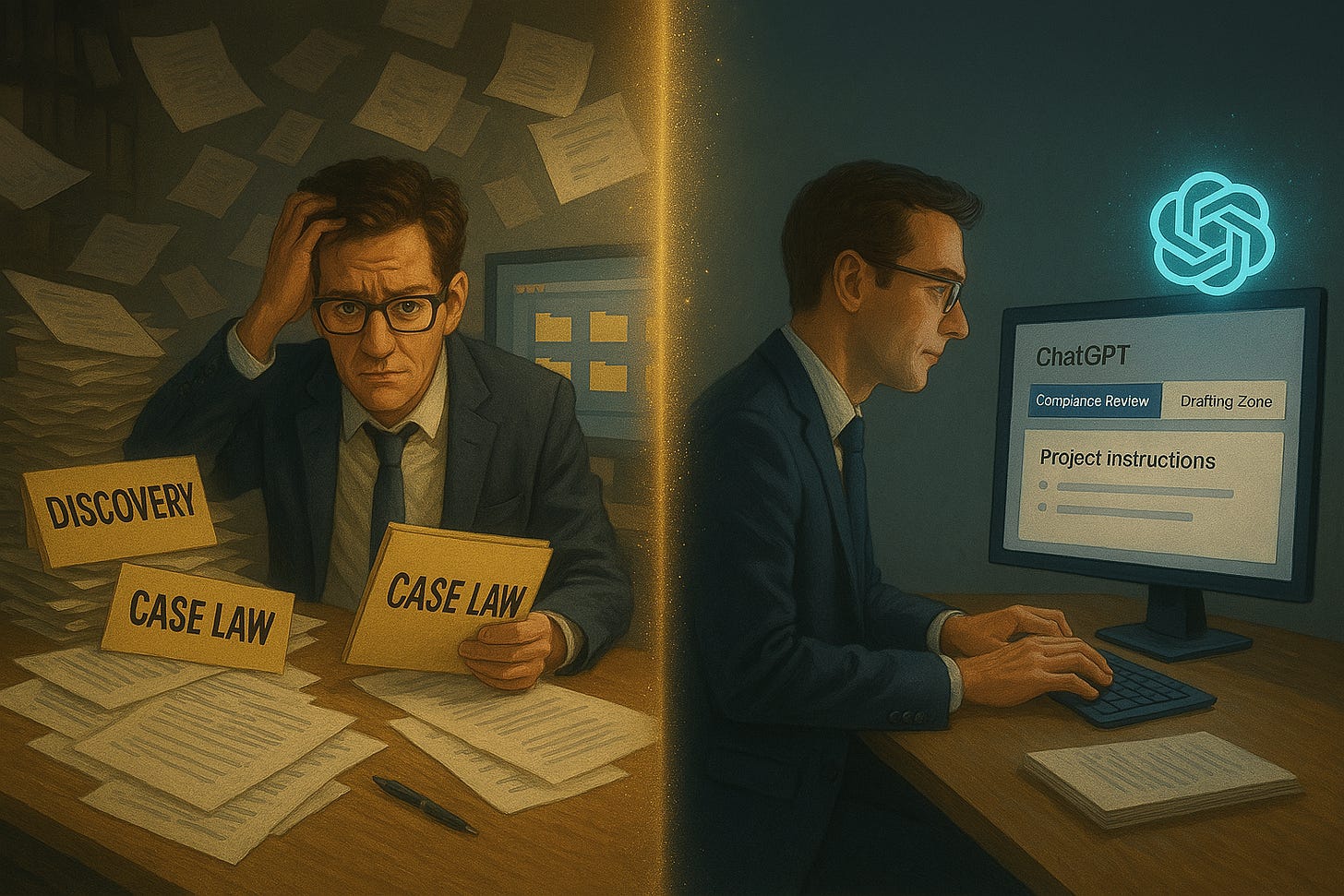ChatGPT Projects: The Organizational Game-Changer for Legal (and other!) Professionals
ChatGPT Projects is like Marie Kondo for your AI workflows—everything in its place and sparking productivity for legal professionals.
As someone who's spent years helping businesses implement AI tools, I've seen firsthand how organizations can make or break productivity. That's why I was particularly excited when OpenAI introduced the Projects feature in ChatGPT. It's fundamentally changed how I manage my AI workflows, and for legal professionals especially, it's a revelation worth exploring.
What Is the ChatGPT Projects Feature?
Think of Projects as your personal workspace within ChatGPT. It allows you to group related conversations, files, and custom instructions all in one dedicated space. Rather than hunting through a long list of random chats to find that contract analysis from last month, you can now keep everything organized by matter, client, or practice area.
I've always believed that the best tech solves real problems without creating new ones, and Projects do that. It's designed to eliminate context-switching and information retrieval friction that plagues knowledge workers.
Why It's Actually Useful (Not Just Another Feature)
The beauty of Projects isn't just in keeping things tidy – it's about maintaining context. When working on complex legal matters, context is everything. Here's what makes Projects genuinely valuable:
First, you can upload relevant documents – contracts, case law, statutes – that remain accessible throughout the project. ChatGPT can reference these materials in real-time, eliminating the need to upload the same files repeatedly.
Second, you can set custom instructions specific to each project. For instance, in your "Corporate Acquisition" project, you might instruct ChatGPT always to cite Delaware corporate law when analyzing governance issues.
Third – and this is something many users don't realize – you can switch between different AI models within your project. Working on straightforward contract analysis? GPT-4o might be sufficient. Need a deeper analysis of complex regulatory matters? Switch to o1 for more sophisticated reasoning. Note that this is not something publicized about projects - in fact, if you research it - it says that chats within projects are locked on the 4o model. However, personal experience has shown that in a new chat within a project, you can switch to o1 or now o1 pro and get the reasoning from these models in your answers.
You don't get this flexibility with Custom GPTs, which are locked to a specific model. While Custom GPTs excel as specialized tools you can share with colleagues, Projects offers a more integrated, versatile workspace for your personal use.
Three Real-World Scenarios for Legal Professionals
I recently consulted with a law firm implementing AI workflows, and these three use cases for Projects stood out:
Case Management: One partner created a project for each major litigation. She uploads pleadings, deposition transcripts, and evidence files, then uses different chat threads within the project to brainstorm arguments, draft motions, and prepare witness questions – all with consistent access to case materials and specific formatting instructions.
Regulatory Compliance: A healthcare attorney maintains separate projects for different clients, each with uploaded regulatory frameworks and compliance guidelines. When new regulations emerge, he creates a new chat within the relevant project to analyze impacts, with all necessary context already in place.
Contract Drafting and Review: Several associates use projects to manage contract templates and negotiations. They upload sample agreements, track versions through different chat threads, and maintain client-specific requirements in the project instructions. The real efficiency comes when comparing new contracts against historical precedents, all within the same workspace.
Wrap-Up!
The Project feature isn't revolutionary technology – but it's revolutionized how I use ChatGPT in my daily work. For legal professionals juggling multiple matters, clients, and deadlines, the organizational framework transforms ChatGPT from a helpful assistant into an indispensable part of your practice.
Steve is a Senior Partner at NextAccess and has worked with hundreds of companies to understand and adopt AI in their organizations. He has worked extensively with services firms (law firms, PE firms, consulting firms).
Feel free to reach out via email: steve.smith@nextaccess.com
Want to talk about an AI workshop for your organization or get personal training? Grab a 15-minute slot on my calendar to discuss: https://calendar.app.google/3ctoTDUgtg71TQDG7


